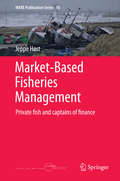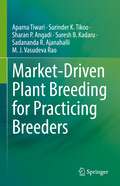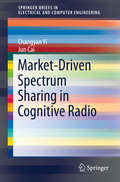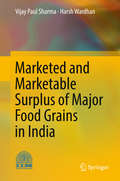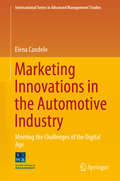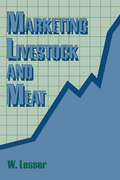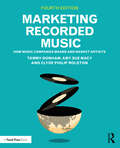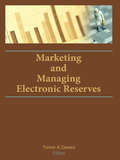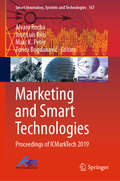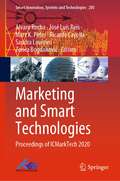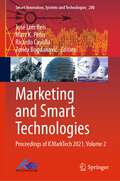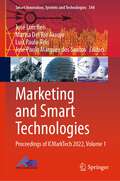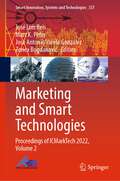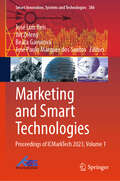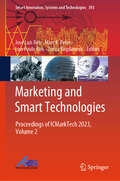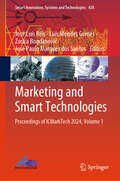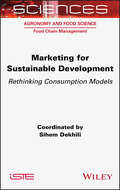- Table View
- List View
Market Operation for Reactive Power Ancillary Service: Design and Analysis with GAMS Code (Springer Tracts in Electrical and Electronics Engineering)
by K. Shanti Swarup Devika JayThis book provides a framework suitable for the design and analysis of market mechanisms suitable for reactive power ancillary service. The book focuses on the formulation of market mechanisms capable of handling the localized nature of reactive power. The book presents tools and methodologies to design a suitable market structure capable of handling the technical challenges associated with the reactive power market like localized nature or reactive power, voltage support requirement, reactive power reserve requirement, and coupling between active reactive power markets. The book also presents techniques suitable for analyzing the market efficiency of different market mechanisms for reactive power ancillary service. The key topics discussed in this book include the relevance and challenges of reactive power ancillary service; the design of market mechanisms; network partitioning techniques to handle the localized nature of reactive power; and analysis of market mechanisms for market efficiency. This book is helpful for researchers and graduate students to know about recent advances in this area. Practitioners find the book helpful for understanding how technological advances can be put into practice and learning from case studies that bring out practical challenges.
Market-Based Fisheries Management
by Jeppe HøstThis book reveals how a privatization of fish resources has paved the way for a wide-reaching concentration and change in ownership. It is a thought-provoking contribution to the debate on the future of European fisheries and the possible solutions to overfishing in Europe. Readers will discover a timely, critical insight into the social, cultural and economic aspects and consequences of market-based fisheries management. The privatization of fish quotas in Denmark represents one of the most far-reaching and comprehensive privatization schemes of its kind and has been widely promoted as a market-based system with innovative social safeguards. This work critically examines this privatization of fish resources, combining quantitative and qualitative material to provide new understanding of fish quotas and their social value. Scholars with an interest in privatization and the socio-economic aspects of fisheries, and those working with NGOs, fishers and fisheries, and concerned with political conflicts will all value the research presented here.
Market-Driven Plant Breeding for Practicing Breeders
by Aparna Tiwari Surinder K. Tikoo Sharan P. Angadi Suresh B. Kadaru Sadananda R. Ajanahalli M. J. Vasudeva RaoThis book highlights the technicalities of plant breeding in a seed-business environment and explains the crucial aspects of the value chain. It educates the readers on how to initiate, participate, sustain national and international agreements for material transfer, how consortia work to facilitate germplasm accessibility, and how to set visionary goals to develop a superior plant varieties. The book covers the aspects such as how to conduct disease screening trials at hot spots, preparing an operational budget, and how to accelerate product advancement. Plant breeding is broadly defined as manipulation of plant genotypes to create phenotypes that are beneficial to mankind. It helps to achieve food security and sustainability by developing high yielding, climate-resilient, nutritious varieties of crops and hence is able to address unprecedented challenges like rising global population, diminishing genetic biodiversity, and uncertainties of the weather . This book is an extraordinary source of information starting from goal-genesis to market-oriented product-profiling and help readers to accelerate/enhance? their work/professional performance more effectively. This book will be very useful to practicing plant breeders at various levels in the public and private sectors. It is a must-have book for potential plant breeders who enter plant breeding profession just after the completion of their formal plant breeding education.
Market-Driven Spectrum Sharing in Cognitive Radio
by Changyan Yi Jun CaiThis brief focuses on the current research on mechanism design for dynamic spectrum sharing in cognitive radio (CR) networks. Along with a review of CR architectures and characteristics, this brief presents the motivations, significances and unique challenges of implementing algorithmic mechanism design for encouraging both primary spectrum owners and secondary spectrum users to participate in dynamic spectrum sharing. The brief then focuses on recent advances in mechanism design in CR networks. With an emphasis on dealing with the uncertain spectrum availabilities, mechanisms based on spectrum recall, two-stage spectrum sharing and online spectrum allocation are introduced with the support of theoretic analyses and numerical illustrations. The brief concludes with a discussion of potential research directions and interests, which will motivate further studies on mechanism design for wireless communications. This brief is concise and approachable for researchers, professionals and advanced-level students in wireless communications and networks.
Marketed and Marketable Surplus of Major Food Grains in India
by Vijay Paul Sharma Harsh WardhanThis book helps readers understand the concepts of marketed and marketable surplus, as well as the role of the government and marketing agencies, including those in the private sector, in improving market efficiency. It also examines the impact of various socioeconomic, technological, institutional, infrastructure, and price factors on the marketed surplus of major crops. While Indian agriculture has become increasingly market-oriented and monetized, the importance of market orientation of agriculture is also being recognized at the international level. The proportion of agricultural production that is marketed by farmers has increased significantly over the last few decades in India: in the early 1950s, about 30-35 per cent of food grains output was marketed, which has now increased to more than 70 per cent. In this context, the marketed surplus is proportionately higher in the case of commercial crops than subsistence crops. Recognizing its importance, the Government of India initiated a nation-wide survey to estimate marketable surplus and post-harvest losses in the early 1970s, which continued up to the late 1990s. As Indian agriculture, has undergone significant transformation, and no reliable estimates of marketed and marketable surplus are available, the study was conducted to estimate the marketed and marketable surplus of major food crops in leading producing states, and to examine important factors which determine the level of marketed surplus for various categories of farms. The results of this study offer a valuable resource for designing effective food procurement, distribution and price policies. Further, they provide reliable estimates of household farm retention pattern for self-consumption, seed, feed, wages and other payments in kind, which can be used as the basis for planning infrastructure development of storage and distribution. This essential information can help policy-makers determine how much marketed surplus is generated by the different categories of farmers and how marketable surplus would respond to changes in diverse economic and non-economic variables, allowing them to design policies accordingly.
Marketing (13th Edition)
by Roger A. Kerin Steven W. HartleyKerin/Hartley's Marketing 13th edition is the most robust Principles of Marketing solution available to meet the needs of a wide range of faculty. Marketing focuses on decision making through extended examples, cases, and videos involving real people making real marketing decisions. The author team's decades of combined experience in the higher education classroom continue to inform the title's innovative pedagogical approach. Marketing is known for its conversational writing style, ability to engage students through active learning techniques, and vivid descriptions of businesses, marketing professionals, and entrepreneurs in cases, exercises, and testimonials that help students personalize marketing and identify possible career interests.
Marketing Big Oil: Brand Lessons from the World’s Largest Companies
by Mark L. Robinson"For the largest oil companies - referred to as Big Oil - branding and brand management are complex, due to the historical negativity surrounding the original Big Oil company - Standard Oil. Even though today's largest oil companies, Exxon Mobil, BP, Royal Dutch Shell, and Chevron, have spent millions on improving their corporate brand image and reputation, negativity continues to surround these firms. Marketing Big Oil begins with an historical perspective looking at how Big Oil came to be through a series of monumental acquisitions, first through the breakup of Standard Oil in the late 19th century and then with the large mergers and acquisitions in the late 1990s and early 2000s. Robinson analyzes the marketing and corporate branding programs of these oil titans to demonstrate what does and doesn't work, and shows us how even the largest companies sometimes fail to get their message across. He explores the industry's use of social media, mobile e-commerce, advertising, app development, and more"--
Marketing Innovations in the Automotive Industry: Meeting the Challenges of the Digital Age (International Series in Advanced Management Studies)
by Elena CandeloThis book proposes that, within the automotive industry, revised marketing principles and innovative marketing strategies are needed to address more effectively the unprecedented challenges posed by the modern digital revolution. The starting point for these proposals is a thorough analysis of the evolution of marketing in the industry across three ages of technological innovations – the mechanical, the electronic, and the digital. The main objectives are first, to illustrate how study of the past can help carmakers as they move forward into the unknown, and second, to identify the main choices that they will face. The central premise is that unusual times call for unusual strategies. By mining the past in order to foresee likely future developments regarding competition and marketing strategies within the car industry, the book will appeal both to researchers and to present or future managers in the automotive and other innovation-driven sectors.
Marketing Livestock and Meat
by William H LesserThis groundbreaking volume presents a comprehensive view of the many concerns of those involved with livestock and meat marketing. During the 1980s, livestock production faced some critical changes. Product and feed prices became less stable, cycles lost their century-old patterns, both competition and trade barriers seemed to rise, and market outlets shrank in number and ownership diversity. At the same time, the United States demography became increasingly older, while new and confusing health concerns about red meat arose rapidly. This practical book introduces the reader to a range of issues of the livestock marketing system and looks ahead to such future issues as biotechnology, human health, and food safety. Considerable interest is given to international trade, an increasingly important sector in the market.Marketing Livestock and Meat is a concise and convenient compendium of diverse information. It provides functionaries in the system with an overall concept of how the market functions as a whole to promote better skills and strategies for marketing of red meats. The author describes specific applications vital to successful operation of the complex and far-reaching marketing system of meat and livestock, including international trade, grades and grading, health matters, demand for meat, price reporting and electronic markets, costs and benefits, and their combination into marketing strategies for producers. To supplement the research, theories, and strategies presented in this important book, there are many charts, graphs, and photographs. All persons connected to the marketing of meat and livestock--undergraduate students in North America, foreign students interested in exporting meat to the U. S., and most segments of the livestock sector, including supply and processing firms and retailers--will benefit from this important book.
Marketing Projects (Best Practices in Portfolio, Program, and Project Management)
by Olivier MeslyMarketing is about placing a new product or service into the market. Projects are about delivering new products and services. The merger of these two fields holds great promise for delivering value to organizations and their clients. Project managers can serve many markets ranging from investors who fund projects to that of clients who use new products and services. Marketing Projects is a guide for helping project managers have projects funded or deliver value to end users. It is also a guide for marketing managers new to the world of project management. The book begins by presenting the basics of both marketing and project management and highlights the aspects that are unique and relevant to both areas. It then explores marketing project feasibility and presents tools for assessing feasibility, which include the 6Ps of project management strategy: The project 4Ps: plan, processes, people, and power PRO: pessimistic, realistic, and optimistic scenarios POVs: points of vulnerability POE: point of equilibrium POW: product, organization, and work breakdown structures PWP: work psychodynamics This book illustrates how to use these tools to market new projects to potential sponsors and investors. It then explores marketing projects to end users. Crucial to the success of projects are the relationships between project managers and clients and the way marketing experts implement their strategies. This book explains how project managers can develop meaningful relationships with clients to foster trust and have positive interactions. Project managers excel at managing the processes for delivering new products and services. Marketers are keenly aware of latent, or unconscious needs, as well as those developing and emerging, and can provide project promoters and managers with exciting ideas. This book will help improve the mutual understanding between marketing and project managers, an effort ultimately benefiting end users, whether they be investors or customers. A better work atmosphere and a closer fit between marketing and project management objectives can only serve the interests of investors and end users, for whom marketers and project managers conceive and realize projects, one way or the other.
Marketing Recorded Music: How Music Companies Brand and Market Artists
by Clyde Philip Rolston Tammy Donham Amy Sue MacyThis fourth edition of Marketing Recorded Music is the essential resource to help you understand how recorded music is professionally marketed. Updated to reflect the digital era, with new chapters on emerging media, streaming, and branding, this fourth edition also includes strategies for independent and unsigned artists. Fully revised to reflect international marketing issues, Marketing Recorded Music is accompanied by a companion website with additional online resources, including PowerPoints, quizzes, and lesson plans, making it the go-to manual for students, as well as aspiring and experienced professionals.
Marketing Renewable Energy
by Christian Friege Carsten HerbesThis book answers questions such as: How do you market green electricity or bio-methane? What is the right price for renewable energy? How do the legal framework and customer preferences influence marketing strategies? Is direct marketing or online marketing the key to success? Answers to these and many other questions can be found in this volume, which gathers contributions from leading researchers and respected practitioners. Employing an easy-to-follow, clearly structured format, it combines the latest research results and concrete case studies to help readers understand the fundamentals of marketing for renewable energies and new business models from different countries.
Marketing and Managing Electronic Reserves
by Trevor A. DawesGet practical solutions to the problems faced when implementing an electronic reserve service!Academic libraries that provide electronic reserve services offer convenient access to information to their students and faculty while gaining numerous other advantages, such as reducing both loss and staff workload. Marketing and Managing Electronic Reserves presents leading authorities with practical solutions to the challenges in effectively integrating electronic reserves services and marketing them to users. This book provides positive approaches that any academic library considering the implementation of an electronic reserve operation can use. All factors are considered, including size of institution, the relationship between the library and academic departments, and the budget and plan for marketing the service.More and more colleges and universities are implementing distance education programs, highlighting the increasing need for remote access to information in the library, including reserve material. But executing monumental change is always difficult. Marketing and Managing Electronic Reserves tackles the difficult issues, discussing various libraries&’ journeys in bringing about the changes needed to remain the central information source for students and faculty. Problems inherent in the evolution from traditional reserve services to electronic reserves are examined, offering effective strategies for smooth transition. Whatever type of system you are considering, from homegrown to commercial to hybrid electronic reserves service, this book can help. Marketing and Managing Electronic Reserves explains how others tackled challenges, such as: implementing Endeavor&’s Voyager Integrated Library System and the software used for authenticating users handling copyright compliance integration of electronic reserves into course management systems moving from a paper-based to a Web-based course reserve system offering and marketing one-stop teaching support to faculty a large institution&’s shift to a collaborative approach with electronic reserves and course management software establishing a suite of electronic utilities that fulfills teaching and essential learning activities implementing the Blackboard Content System marketing for a smooth transition from traditional to electronic reserves marketing to the faculty process improvement technique applied to electronic reserves integration of electronic reserve with a Library Management System and Course Management System trends for the futureMarketing and Managing Electronic Reserves is crucial reading for access services librarians, circulation and reserve librarians, public service librarians, library school faculty who teach public services courses, integrated library systems managers, and university course management software specialists.
Marketing and Smart Technologies: Proceedings of ICMarkTech 2019 (Smart Innovation, Systems and Technologies #167)
by Álvaro Rocha José Luís Reis Marc K. Peter Zorica BogdanovićThis book includes selected papers presented at the International Conference on Marketing and Technologies (ICMarkTech 2019), held at Maieutica Academic Campus (University Institute of Maia & Polytechnic Institute of Maia) in Maia, Portugal, from 27 to 29 November 2019. It covers up-to-date cutting-edge research on artificial intelligence applied in marketing, virtual and augmented reality in marketing, business intelligence databases and marketing, data mining and big data, marketing data science, web marketing, e-commerce and v-commerce, social media and networking, geomarketing and IoT, marketing automation and inbound marketing, machine learning applied to marketing, customer data management and CRM, and neuromarketing technologies.
Marketing and Smart Technologies: Proceedings of ICMarkTech 2020 (Smart Innovation, Systems and Technologies #205)
by Álvaro Rocha José Luís Reis Marc K. Peter Zorica Bogdanović Ricardo Cayolla Sandra LoureiroThis book includes selected papers presented at the International Conference on Marketing and Technologies (ICMarkTech 2020), held at ISCTE - University Institute of Lisbon, in the city of Lisbon in Portugal, between 8 and 10 October 2020. It covers up-to-date cutting-edge research on artificial intelligence applied in marketing, virtual and augmented reality in marketing, business intelligence databases and marketing, data mining and big data, marketing data science, web marketing, e-commerce and v-commerce, social media and networking, geomarketing and IoT, marketing automation and inbound marketing, machine learning applied to marketing, customer data management and CRM, and neuromarketing technologies.
Marketing and Smart Technologies: Proceedings of ICMarkTech 2021, Volume 1 (Smart Innovation, Systems and Technologies #279)
by Luiz Moutinho José Luís Reis Eduardo Parra López José Paulo Marques dos SantosThis book includes selected papers presented at the International Conference on Marketing and Technologies (ICMarkTech 2021), held at University of La Laguna, Tenerife, Spain, during December 2–4, 2021. It covers up-to-date cutting-edge research on artificial intelligence applied in marketing, virtual and augmented reality in marketing, business intelligence databases and marketing, data mining and big data, marketing data science, web marketing, e-commerce and v-commerce, social media and networking, geomarketing and IoT, marketing automation and inbound marketing, machine learning applied to marketing, customer data management and CRM, and neuromarketing technologies.
Marketing and Smart Technologies: Proceedings of ICMarkTech 2021, Volume 2 (Smart Innovation, Systems and Technologies #280)
by José Luís Reis Marc K. Peter Zorica Bogdanović Ricardo CayollaThis book includes selected papers presented at the International Conference on Marketing and Technologies (ICMarkTech 2021), held at University of La Laguna, Tenerife, Spain, during December 2–4, 2021. It covers up-to-date cutting-edge research on artificial intelligence applied in marketing, virtual and augmented reality in marketing, business intelligence databases and marketing, data mining and big data, marketing data science, web marketing, e-commerce and v-commerce, social media and networking, geomarketing and IoT, marketing automation and inbound marketing, machine learning applied to marketing, customer data management and CRM, and neuromarketing technologies.
Marketing and Smart Technologies: Proceedings of ICMarkTech 2022, Volume 1 (Smart Innovation, Systems and Technologies #344)
by Luís Paulo Reis José Luís Reis José Paulo Marques dos Santos Marisa Del Rio AraujoThis book includes selected papers presented at the International Conference on Marketing and Technologies (ICMarkTech 2022), held at Universidade de Santiago de Compostela, Spain, during 1 – 3 December 2022. It covers up-to-date cutting-edge research on artificial intelligence applied in marketing, virtual and augmented reality in marketing, business intelligence databases and marketing, data mining and big data, marketing data science, web marketing, e-commerce and v-commerce, social media and networking, geomarketing and IoT, marketing automation and inbound marketing, machine learning applied to marketing, customer data management and CRM, and neuromarketing technologies.
Marketing and Smart Technologies: Proceedings of ICMarkTech 2022, Volume 2 (Smart Innovation, Systems and Technologies #337)
by José Luís Reis Marc K. Peter Zorica Bogdanović José Antonio Varela GonzálezThis book includes selected papers presented at the International Conference on Marketing and Technologies (ICMarkTech 2022), held at Universidade de Santiago de Compostela, Spain, during December 1–3, 2022. It covers up-to-date cutting-edge research on artificial intelligence applied in marketing, virtual and augmented reality in marketing, business intelligence databases and marketing, data mining and big data, marketing data science, web marketing, e-commerce and v-commerce, social media and networking, geomarketing and IoT, marketing automation and inbound marketing, machine learning applied to marketing, customer data management and CRM, and neuromarketing technologies.
Marketing and Smart Technologies: Proceedings of ICMarkTech 2023, Volume 1 (Smart Innovation, Systems and Technologies #386)
by José Luís Reis José Paulo Marques dos Santos Jiří Zelený Beáta GavurováThis book includes selected papers presented at the International Conference on Marketing and Technologies (ICMarkTech 2023), held at Faculty of Economics and Management (FEM), Czech University of Life Sciences Prague (CZU), in partnership with University College Prague (UCP), in Prague, Czech Republic, between 30 November and 2 December 2023. It covers up-to-date cutting-edge research on artificial intelligence applied in marketing, virtual and augmented reality in marketing, business intelligence databases and marketing, data mining and big data, marketing data science, web marketing, e-commerce and v-commerce, social media and networking, geomarketing and IoT, marketing automation and inbound marketing, machine learning applied to marketing, customer data management and CRM, and neuromarketing technologies.
Marketing and Smart Technologies: Proceedings of ICMarkTech 2023, Volume 2 (Smart Innovation, Systems and Technologies #393)
by Luís Paulo Reis José Luís Reis Marc K. Peter Zorica BogdanovicThis book includes selected papers presented at the International Conference on Marketing and Technologies (ICMarkTech 2023), held at Faculty of Economics and Management (FEM), Czech University of Life Sciences Prague (CZU), in partnership with University College Prague (UCP), in Prague, Czech Republic, between 30 November and 2 December 2023. It covers up-to-date cutting-edge research on artificial intelligence applied in marketing, virtual and augmented reality in marketing, business intelligence databases and marketing, data mining and big data, marketing data science, web marketing, e-commerce and v-commerce, social media and networking, geomarketing and IoT, marketing automation and inbound marketing, machine learning applied to marketing, customer data management and CRM, and neuromarketing technologies.
Marketing and Smart Technologies: Proceedings of ICMarkTech 2024, Volume 1 (Smart Innovation, Systems and Technologies #438)
by José Luís Reis Zorica Bogdanović José Paulo Marques dos Santos Luís Mendes GomesThis book includes selected papers presented at the International Conference on Marketing and Technologies (ICMarkTech 2024), held at University of Azores, Ponta Delgada, Azores, Portugal, between December 5 and 7, 2024. It covers up-to-date cutting-edge research on artificial intelligence applied in marketing, virtual and augmented reality in marketing, business intelligence databases and marketing, data mining and big data, marketing data science, web marketing, e-commerce and v-commerce, social media and networking, geomarketing and IoT, marketing automation and inbound marketing, machine learning applied to marketing, customer data management and CRM, and neuromarketing technologies.
Marketing for Sustainable Development: Rethinking Consumption Models
by Sihem DekhiliMany people see a weak association between marketing and sustainable development and even consider them as two incompatible fields. However, marketing benefits from an extremely powerful position to encourage transformations at the production level and to guide consumers towards responsible behaviors. From its inception, marketing has been positioned as a support for the relationship between the company and its customers, with the quest for well-being set in the very foundations of the discipline. In a context that is marked by crises and much skepticism, marketing today should, more than ever, prove that it acts in good faith. This book offers practitioners, public authorities, professors and students illustrations that demonstrate that the dissemination of sustainable practices is indeed a marketing issue. It argues that it is particularly important not only to overcome the divide between the concepts of marketing and sustainability, but also to use marketing tools and frameworks to support sustainable development and strengthen the green market.
Marketingkonzeptionen für Ingenieure (essentials)
by Ekbert HeringMarketing ist nach modernem Verständnis die Führung eines Unternehmens vom Markt her. Erfolgreich wird ein Unternehmen nur sein, wenn es seine Produkte und Dienstleistungen so bereitstellt, dass sie den Bedürfnissen des Marktes entsprechen und somit aktuelle Kundenwünsche befriedigen. Für eine erfolgreiche Marketingkonzeption ist folgendes entscheidend: Trends zu erkennen, Kundengruppen zu selektieren und deren Bedürfnisse relativ zum Wettbewerber besser zu befriedigen sowie dies den betreffenden Kunden zu kommunizieren. Die daraus abgeleitete Systematik wird durch den Marketingmix beschrieben, der durch die neun P: Produkt-Mix (product), Preis-Mix (price), Distributions-Mix (Place), Kommunikations-Mix (Promotion), Kontrahierungs-Mix (Precise contract), Mitarbeiter-Mix (People), Prozesse, Gebäude und Anlagen (Physical Facilities) sowie Kooperations-Mix (Partnership) gekennzeichnet ist. Marketing-Controlling ermöglicht es, die gesetzten Ziele zeitnah zu erfassen, die Zieleinhaltung festzustellen und entsprechende Korrekturen vorzunehmen.
Markets and Measurements in Nineteenth-Century Britain
by Aashish VelkarMeasurements are a central institutional component of markets and economic exchange. By the nineteenth century, the measurement system in Britain was desperately in need of revision: a multiplicity of measurement standards, proliferation of local or regional weights and measures, and a confusing array of measurement practices made everyday measurements unreliable. Aashish Velkar uncovers how metrology and economic logic alone failed to make 'measurements' reliable, and discusses the importance of localised practices in shaping trust in them. Markets and Measurements in Nineteenth-Century Britain steers away from the traditional explanations of measurement reliability based on the standardisation and centralisation of metrology; the focus is on changing measurement practices in local economic contexts. Detailed case studies from the industrial revolution suggest that such practices were path-dependent and 'anthropocentric'. Therefore, whilst standardised metrology may have improved precision, it was localised practices that determined the reliability and trustworthiness of measurements in economic contexts.

